The latest
EPS Packaging in Numbers
EPS embraces the future of the circular economy
through mechanical and chemical recycling
EPS is an extremely lightweight material
tiny EPS beads expand like popcorn
EPS packaging is recycled at high rates
in many European countries: Norway, Denmark, Greece and the Netherlands
EPS packaging waste is collected
to prevent landfilling
Objective for recycling activities by 2025
on EPS packaging waste
EPS contributes to achieve the European circular and sustainable targets
EUMEPS, with the Smart Packaging Europe initiative, advocates for the irreplaceable contribution of Expanded Polystyrene (EPS) to critical areas of environmental regulation.
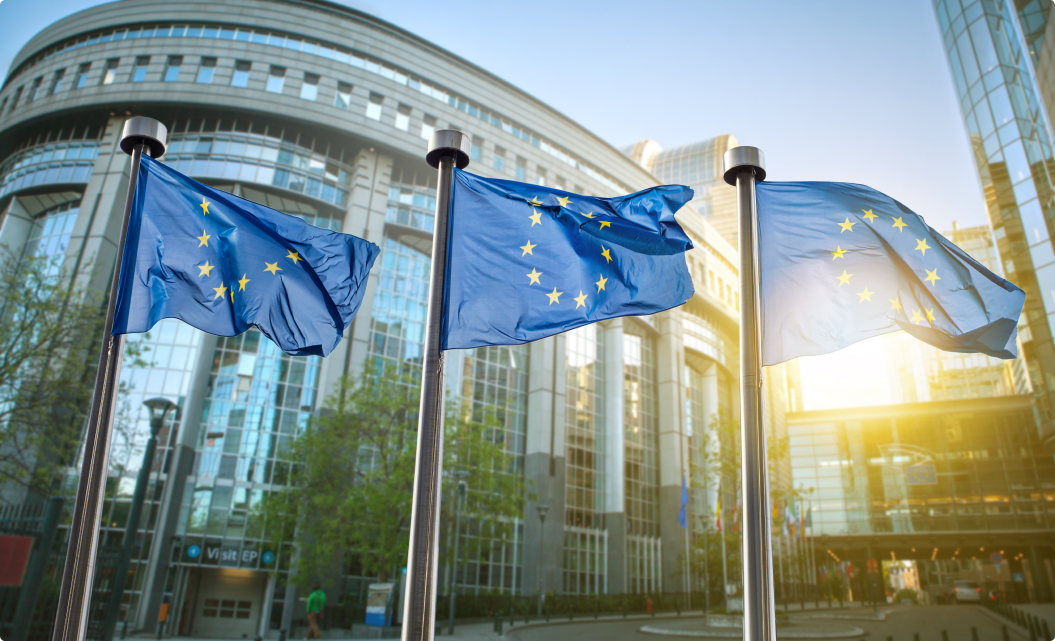

The Voice of the European EPS Industry
Home Packaging

Faces of EUMEPS: an Interview with Eline Sohlberg (Sweden)
- Details
- Written by: Ingrid
- Category: News
- Hits: 124
Across Europe, momentum is building around practical solutions that support a circular economy while maintaining industrial efficiency and material performance. Expanded polystyrene (EPS), with its proven recyclability and resource-efficient profile, is increasingly recognised as part of this progress.
In this interview, Elin Sohlberg, Head of the Circular Division at BEWI, shares her perspective on how EPS can be managed as a valuable circular resource. She discusses BEWI’s integrated approach to recycling, the importance of effective collection systems, and the role of collaboration and innovation in strengthening Europe’s EPS value chain.
Elin, you have recently taken on the role of Head of the Circular Division at BEWI. What motivated this step in your career, and what does this new responsibility represent for you?
Taking on the role of Head of the Circular Division was a natural progression of my passion for sustainability and innovation. Over the years, I’ve seen firsthand the critical importance of closing the loop on materials that are widely used, yet under-recycled. EPS is one such material, highly durable and valuable, yet often misunderstood. Stepping into this role allows me to lead a team committed to transforming EPS from a single-use perspective into a truly circular resource. It represents a chance to align business performance with environmental leadership and to help shape industry practices that can have a meaningful impact across Europe.
BEWI Circular operates within one of Europe’s largest vertically integrated EPS groups. How does this structure strengthen your capacity to scale up EPS recycling?
Being part of a vertically integrated group gives us exceptional advantages in scaling EPS recycling. It means we have visibility and influence across the entire value chain, from material sourcing and product design through to manufacturing, collection, and reuse. This integration enables efficient logistics, optimised processing, and closer collaboration between production and circularity teams. Rather than working in silos, we can iterate quickly and implement systemic improvements that accelerate recycling capacity and quality at scale. It also strengthens our ability to invest in the right infrastructure and partnerships for long-term impact.

Few people realise that EPS is 100% recyclable and often outperforms alternatives in environmental impact. What do you wish policymakers and the wider public better understood about EPS?
I wish there was wider recognition that EPS is not only 100% recyclable, but also one of the most resource-efficient materials available when managed properly. It’s lightweight, durable, and often requires less energy and fewer raw materials to produce compared with many alternatives. Sadly, perception hasn’t kept pace with innovation. Too many policymakers and consumers still see EPS as waste rather than a high-value resource. We need to shift the narrative: EPS should not be dismissed because of visible litter issues; solutions must focus on better collection, awareness, and infrastructure, not bans alone.
Collection remains one of the major bottlenecks in EPS recycling. In your view, what concrete actions are needed to significantly improve collection rates across Europe?
Improving EPS collection starts with three concrete priorities:
- Standardised collection streams across municipalities—so EPS isn’t excluded from recycling programs or ends up in mixed waste.
- Incentives for return systems, particularly for commercial and industrial EPS, which form a large part of the waste stream.
- Public education and collaboration with waste managers to build understanding of how to handle EPS correctly.
We also need policy frameworks that require manufacturers and distributors to support collection infrastructure, creating accountability and funding for sustainable end-of-life solutions. Without these structural changes, recycling rates will continue to lag behind the material’s potential.
Europe’s plastics recycling sector is facing intense pressure. What makes you confident that the EPS value chain — and BEWI Circular — can remain resilient in this context?
Resilience comes from both the inherent properties of EPS and the commitment of the value chain. EPS retains high material quality through multiple recycling loops, a major advantage compared with some other plastics. At BEWI Circular, we’re investing in technology, partnerships, and market development to ensure recycled EPS has strong commercial value. Our vertically integrated position also provides stability: we can balance supply and demand more effectively and reinvest in growth areas even when external pressures are high. Ultimately, resilience is rooted in collaboration across industry, policymakers, and customers to build markets that recognise recycled EPS as a reliable, valuable input.
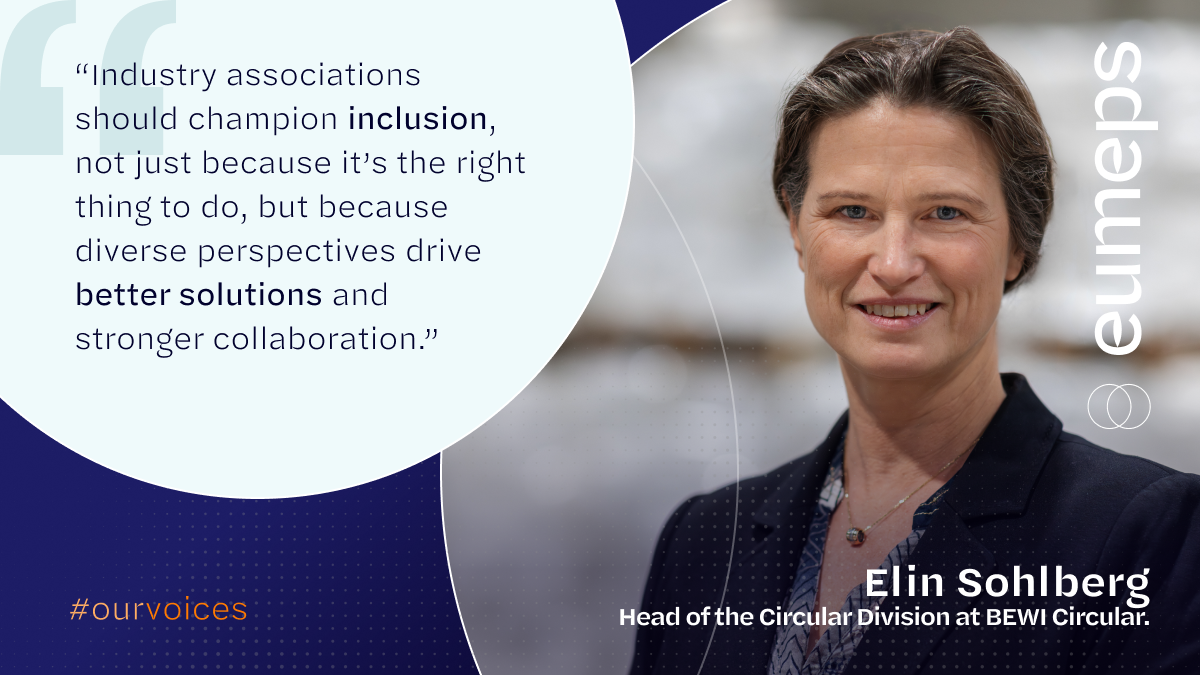
Your ambition is to ‘close the loop’ for EPS. What does a truly circular EPS system look like in practice, and what milestones do you see ahead?
A truly circular EPS system means:
- High collection rates: EPS waste is consistently captured across all segments, commercial, industrial, and household.
- Efficient recycling infrastructure: Multiple facilities across regions capable of processing a broad range of EPS waste streams.
- Strong markets for recycled material: Recycled EPS is an accepted and preferred feedstock in new products.
- Design for circularity: Products are designed from the outset to be easier to collect and recycle.
Key milestones ahead include establishing collection protocols in every key European market, achieving measurable increases in recycling capacity year on year, and establishing certification schemes that recognise recycled EPS content. Ultimately, we want a system where EPS waste is routinely viewed and treated as a resource.
BEWI is an active member of EUMEPS. You participated in the “Women of EUMEPS” campaign. From your perspective, how can EUMEPS support the transition towards circularity, and what role should an industry association play in strengthening Europe’s EPS recycling systems?
EUMEPS plays a vital role in bringing the industry together to advocate for realistic, impactful policies and standards. Associations like EUMEPS can provide data and expertise to policymakers when decisions about material management are being made.
Other important areas include driving harmonisation of recycling practices, supporting the scaling of best practices across borders, and promoting education and awareness about the benefits and recyclability of EPS.
Participating in “Women of EUMEPS” was also a powerful reminder of the importance of diverse voices in shaping a sustainable industry. Industry associations should champion inclusion, not just because it’s the right thing to do, but because diverse perspectives drive better solutions and stronger collaboration.
Looking ahead, which innovations or developments in EPS recycling excite you the most, and how might they reshape Europe’s circular economy?
What excites me most is the coming together of digitalisation and material science in recycling; digital tracking of material that lays a foundation for improved sorting technologies, automation, and advanced chemical recycling techniques that complement mechanical processing. These innovations can unlock new volumes of material that were previously hard to reclaim and improve quality and economic viability. Additionally, design for circularity approaches and forums that connect waste generators with recyclers more efficiently will reshape how we think about EPS as a resource. As these innovations scale, they don’t just transform EPS recycling; they strengthen the broader European circular economy by proving that high-performance plastics can be part of a sustainable future.
Elin Sohlberg’s perspective underlines that achieving a truly circular EPS system is less about reinvention and more about implementation at scale. High collection rates, efficient recycling infrastructure, robust markets for recycled material and design for circularity all emerge as essential building blocks. Her reflections also highlight the importance of collaboration across the value chain and the stabilising role of industry organisations such as EUMEPS, particularly in supporting harmonised approaches and evidence-based policymaking. Taken together, the interview presents a realistic and confident outlook: with the right frameworks in place, EPS can play a reliable and sustainable role in Europe’s climate-neutral and circular.

EUMEPS at the European ETICS Forum 2025: Circularity, Durability and Energy Renovation in Europe
- Details
- Written by: Ingrid
- Category: News - Smart Insulation
- Hits: 559
The 7th European ETICS Forum 2025, organised by the European Association for External Thermal Insulation Composite Systems (EAE), took place on 12 November in Milan. The event gathered more than 200 specialists, including architects, façade engineers, designers, contractors, policymakers, public authorities, researchers and manufacturers, press agents. Viewed as the main European platform dedicated to ETICS, the Forum offers a comprehensive overview of market trends, technical developments and regulatory priorities shaping the renovation of Europe’s buildings.
EUMEPS participated as sponsor and contributor, represented by Jakub Stefaniak, Emanuela Gallo and Bianca Sereinig. The association’s involvement highlighted the central role of expanded polystyrene (EPS) in façade insulation systems and its contribution to circularity, durability and affordable energy renovation. Jakub delivered a dedicated presentation on the contribution of EPS to circular, sustainable and durable ETICS, drawing on studies, data and practical experience from across Europe.
EPS and its contribution to circular, sustainable and durable ETICS
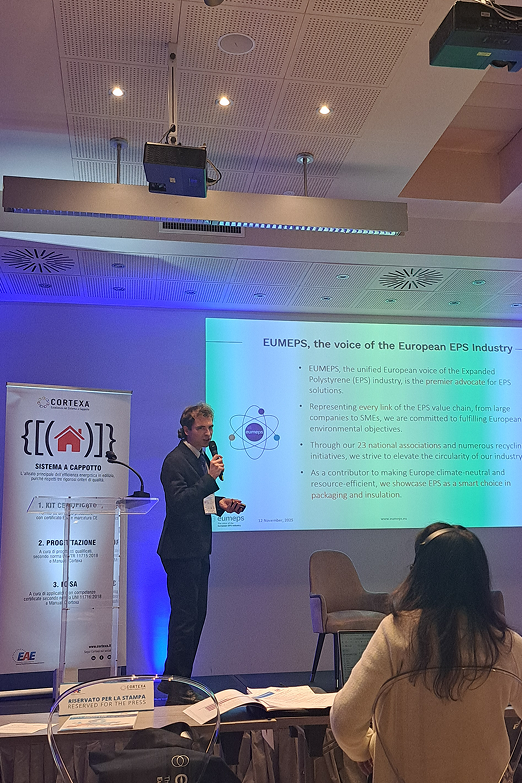 Jakub began by presenting the EPS value chain represented within EUMEPS: raw material suppliers, converters, recyclers, machinery suppliers and 23 national associations across Europe. He explained how EPS contributes simultaneously to the social, economic and environmental dimensions of sustainability.
Jakub began by presenting the EPS value chain represented within EUMEPS: raw material suppliers, converters, recyclers, machinery suppliers and 23 national associations across Europe. He explained how EPS contributes simultaneously to the social, economic and environmental dimensions of sustainability.
On the social aspects, he underlined the direct impact of insulation on living conditions. EPS used in ETICS helps maintain stable indoor temperatures, reducing heat loss during winter and excessive overheating during summer. This leads to lower energy bills — often reduced by 30% to 50% — which is particularly relevant for older buildings and households facing energy poverty. A consistent indoor climate also reduces humidity and mould, improving public health and lowering healthcare costs. Jakub noted: “EPS helps reduce energy bills by 30% to 50% depending on the building, and it contributes to healthier indoor environments by preventing moisture and mould growth.”
On the economic dimension, EPS supports the renovation wave by offering a strong cost-to-thermal-performance ratio. Renovating Europe’s building stock stimulates local employment along the construction value chain and reduces energy consumption, strengthening national energy security. Data from EAE and Cortexa illustrated current trends: Italy, Poland, Romania and the Czech Republic remain the largest ETICS markets, and in 2024, EPS represented 77% of all ETICS insulation.
Environmentally, EPS offers several advantages. It is fully recyclable and compatible with mechanical, physical and chemical recycling technologies. Jakub presented evidence showing that the energy used to produce EPS is offset within approximately two years through energy savings during the lifecycle of the building. Studies also show that recycling can significantly reduce the global warming potential of EPS. Initiatives such as EPSolutely demonstrate practical solutions for reintegrating construction offcuts into production loops. Durability studies presented at the Forum confirmed that EPS maintains its mechanical properties even after decades of use, with examples of systems installed in the 1960s and 1970s still performing well today.
Key messages from the Forum: perspectives from the EUMEPS team
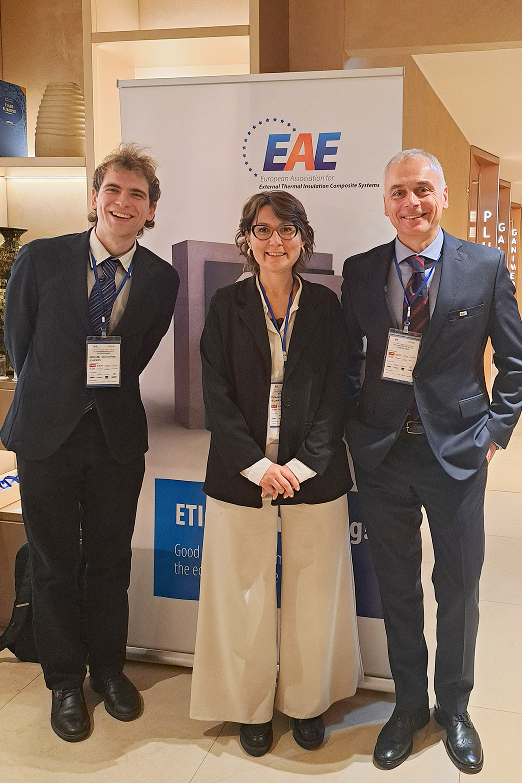 The Forum offered a broad set of insights on regulatory developments, market dynamics and technical performance across Europe. The EUMEPS delegation highlighted several elements as particularly relevant.
The Forum offered a broad set of insights on regulatory developments, market dynamics and technical performance across Europe. The EUMEPS delegation highlighted several elements as particularly relevant.
For Emanuela Gallo, the attendance of more than 200 participants reinforced the high level of interest in ETICS as a strategic solution for energy renovation and decarbonisation. She emphasised the value of the data presented by EAE and Cortexa, which provided a clear picture of Europe’s building stock, market shares, national differences and renovation needs. She remarked on the intervention by EU Commissioner Dan Jørgensen, who outlined the EU’s approach to energy efficiency and renovation policies. As she explained: “The large number of participants shows how central ETICS is to renovation, decarbonisation and sustainability.”
Bianca Sereinig highlighted the practical strengths of the event design. The format offered sufficient time for discussions, exchanges with system suppliers and high-quality interactions with participants from several countries. She noted a strong alignment across the sector on common priorities: energy efficiency, decarbonisation, circularity and affordable housing. In her view, the Forum confirmed that industry actors share a similar understanding of how ETICS can support the transition. She noted: “There is a common understanding in the ETICS sector on energy efficiency, decarbonisation, circularity and affordable housing. It was encouraging to see high interest in these topics from all sides.”
For Jakub Stefaniak, one of the central elements was the diversity of stakeholders and the growing international interest in ETICS. Participants came from multiple sectors and several national administrations. He noted a particularly strong presence from Italy, reflecting the importance of ETICS in the country’s renovation programmes. He also observed that the EPBD remains a key topic for both industry and authorities: “More and more stakeholders are showing interest in insulation and renovation. The EPBD clearly remains a key topic for industry and authorities.”
Looking ahead: expectations for the next edition
 The next edition of the European ETICS Forum will take place in two years, with the EAE Awards planned for 2026 to showcase ETICS projects from across Europe. The EUMEPS team expressed a common set of expectations linked to the evolution of EU policies and national renovation strategies.
The next edition of the European ETICS Forum will take place in two years, with the EAE Awards planned for 2026 to showcase ETICS projects from across Europe. The EUMEPS team expressed a common set of expectations linked to the evolution of EU policies and national renovation strategies.
All three representatives emphasised the importance of EPBD implementation, which is currently entering the phase of national transposition. The coming years will be decisive for defining funding mechanisms, technical requirements and support schemes to accelerate renovation. Jakub expects the next Forum to provide “more insight into EPBD implementation, with a focus on solutions for successful delivery on the ground.”
Bianca hopes to see concrete progress in applying energy-efficiency principles and the emergence of good practices across Member States, especially regarding circularity and end-of-life management of materials. She stressed the relevance of ETICS in making renovation more affordable and accessible: “In two years, I hope we can already present some good practices in EPBD implementation and show concrete progress on efficiency-first with ETICS.”
Emanuela highlighted the value of maintaining the Forum as a platform for collaboration and knowledge sharing. She expects the next edition to keep its focus on decarbonisation, circularity, affordability and renovation policy, while providing an opportunity to compare national approaches and encourage cooperation across the sector. As she stated: “The next Forum will be an opportunity to observe how EPBD implementation advances across countries and to continue exchanges that support collaboration.”
Conclusion
EUMEPS’s participation in the European ETICS Forum 2025 confirmed the strong relevance of EPS as a solution for circular, durable and efficient façade insulation. The event highlighted both the opportunities and challenges facing Europe’s renovation agenda, particularly in the context of EPBD implementation, decarbonisation objectives and housing affordability.
By engaging with policymakers, industry representatives and technical experts, EUMEPS contributed to a constructive exchange on how to accelerate renovation, strengthen circular practices and ensure long-term performance of ETICS systems. The next edition of the Forum will be an important moment to assess progress across Europe and continue building cooperation within the sector.
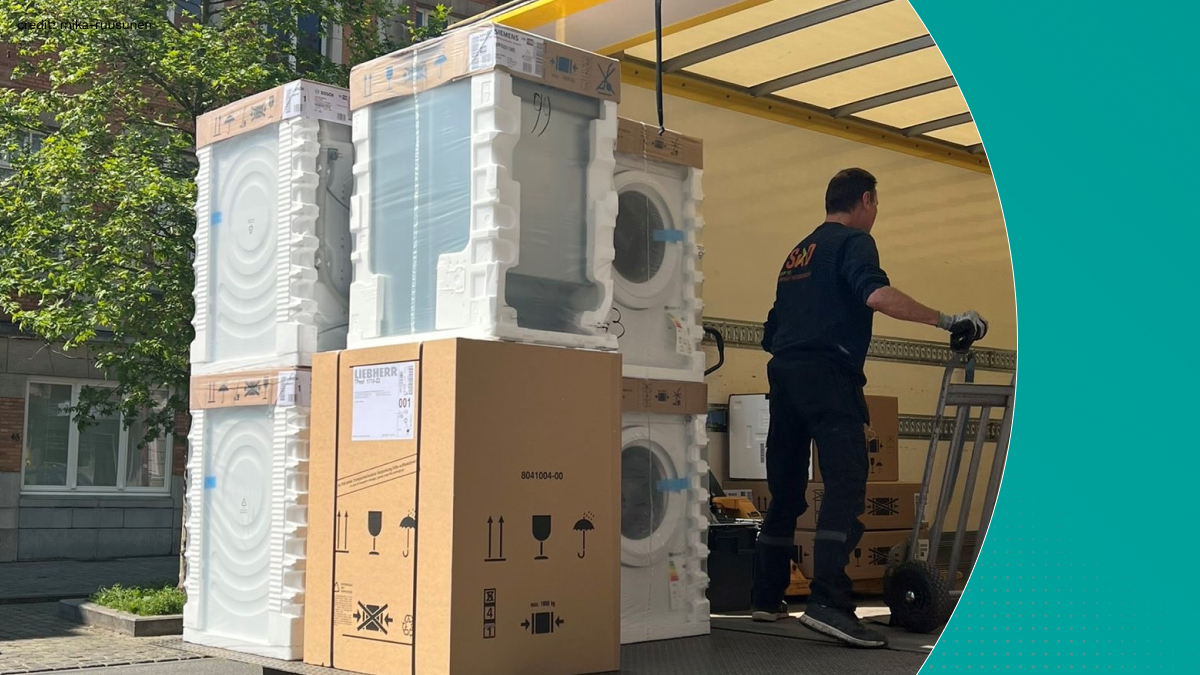
EPS Packaging: What Solutions are Being Considered for its Recycling?
- Details
- Written by: Ingrid
- Category: News - Smart Packaging
- Hits: 381
- Links:
- Link title: Read the original piece, Link URL: https://www.citeo.com/le-mag/emballages-en-pse-quelles-solutions-envisagees-pour-leur-recyclage/
- Link title: Recycling EPS packaging, Link URL: https://eumeps.eu/topics-packaging/recycling-eps-packaging
- Link title: Créa-Styr, recycling project supported by EUMEPS, Link URL: https://eumeps.eu/eumeps-newsroom-packaging/news/eumeps-and-elipso-launch-crea-styr-in-france
- Link title: Citeo, Emballages ménagers et papier, Link URL: https://www.citeo.com/
This article was originally published in French by Citeo on 7 January 2026.
Expanded polystyrene (EPS) is a lightweight, economical and resistant material used mainly to manufacture protective packaging components for household electrical appliances. It represents around 15,000 tonnes of household packaging per year in France, i.e. 15% of styrenic packaging placed on the market. Like all packaging materials, EPS must meet recyclability requirements by 2030, which represents a major challenge. What are the obstacles and the solutions being considered? We explain.
EPS packaging that is difficult to collect and capture
Less than 20% of EPS packaging is sorted by citizens via the yellow bin, despite the widespread communication about the opening of the yellow bin to all packaging, including all plastic packaging. This striking figure can be explained in part by the large size of protective packaging for household appliances (refrigerators, washing machines, televisions, etc.). The consequences are as follows:
- In the majority of cases, EPS packaging is not sorted, and is sometimes even left at the foot of bins and sorting containers.
- When it is sorted, this bulky packaging quickly fills the yellow bin and tends to fragment into small pieces, making it difficult to capture in sorting centres.
- Another practice also makes capture difficult: citizens do not systematically separate all the elements of the packaging or parcels they receive. Upon arrival at the sorting centre, large EPS protective elements are very frequently found nested inside large cardboard boxes. This prevents the recovery and therefore the recycling of both the EPS protective packaging and the cardboard.
Furthermore, at the end of the sorting process, EPS is often degraded and fragmented and has no dedicated outlet. Only mixed recycling solutions with other polystyrene packaging could be considered but, to date, recyclers accept EPS only in very low proportions (less than 5%).
A four-axis strategy towards reduction and circularity
The objective is clear: to enable EPS packaging to be genuinely recycled and to achieve a recycling rate of more than 50% in the medium term. To reach this objective, Citeo has adopted an action plan combining reduction and eco-design, as well as complementary collection schemes to the yellow bin, in order to enable dedicated EPS recycling.
Reduction and eco-design of packaging. Research focuses on improving the recyclability of plastic foams, reducing friability through design, and developing alternatives, notably based on fibrous materials. Examples include moulded cellulose protective packaging developed by AVEC and cellulose-based foams designed by the Technical Centre for Paper, which are compatible with the paper and cardboard packaging stream.
Roll-out of collection at waste recycling centres. This is a solution adapted to the large dimensions of EPS packaging. A trial launched in 2023 with 13 local authorities shows encouraging results: more than 600 tonnes collected across 200 waste recycling centres. Around 15% of French waste recycling centres are already equipped to collect EPS, a system that Citeo is calling to be rolled out more widely.
Take-back of packaging at delivery. This system makes it possible to collect EPS protective packaging directly at the time of delivery of equipment to consumers. Source separation preserves material quality and facilitates recycling. The pilot study conducted in 2024 with the main retailers confirms the relevance of this approach, which can build on the deployment of extended producer responsibility (EPR) for professional packaging from 2026.
Improvement of capture in sorting centres. Efforts to improve the overall capture performance in sorting centres are continuing, even if prospects for EPS remain limited. For EPS packaging that is captured, discussions with PS recyclers are ongoing in order to enable its effective recycling.
The challenges associated with the recycling of expanded polystyrene packaging clearly highlight the need for coordinated action across the entire value chain, from eco-design and collection to sorting and recycling. While EPS presents specific technical and logistical constraints, the solutions outlined demonstrate that pragmatic and scalable pathways towards circularity are emerging.
In this context, EUMEPS, working in close cooperation with Citeo within the framework of CreaStyr, actively supports the development of innovative, technically robust and economically viable recycling solutions for polystyrene. By fostering dialogue between producers, recyclers, local authorities and technical experts, this collaboration aims to accelerate progress towards higher recycling rates, improved material quality and compliance with European recyclability objectives.
Advancing the circularity of EPS packaging will require continued investment, experimentation and collective commitment. EUMEPS remains fully engaged in contributing its expertise to help transform ambition into operational reality and ensure that polystyrene packaging can play a sustainable role in tomorrow’s circular economy.
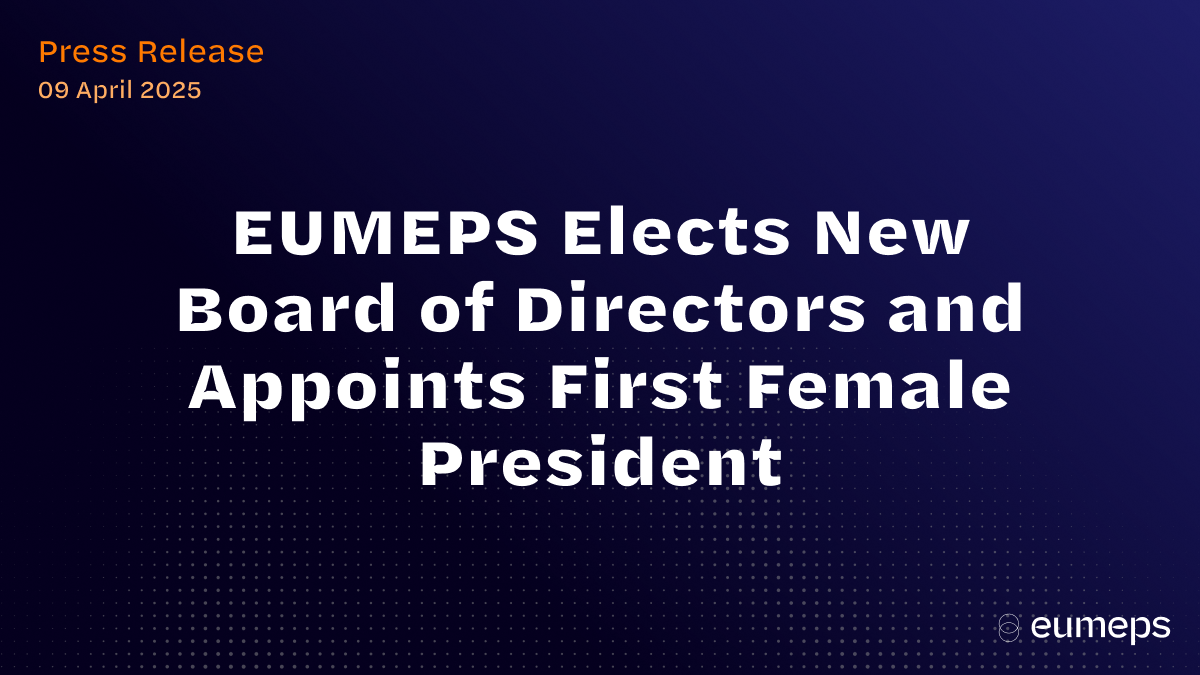
EUMEPS Elects New Board of Directors and Appoints First Female President
- Details
- Written by: Ingrid
- Category: Press releases
- Hits: 1754
- Documents:
- Document Name: Download our press release, Document File: 2025_PR_EUMEPS_new_Board_of_Directors.pdf
- Links:
- Link title: Meet our Board members, Link URL: https://eumeps.eu/about-eumeps/our-structure
A diverse and committed team to guide the European EPS industry towards greater sustainability and circularity.
The General Assembly of EUMEPS, the association representing the entire value chain of Expanded Polystyrene (EPS) in Europe, has elected a new Board of Directors for the 2025–2027 term.
The newly appointed President is Agata Gładysz-Stańczyk (Synthos) – the first woman to hold this position since the creation of the association. She will work alongside three Vice-Presidents: Alan Moss (BEWI), Gregor Haverkemper (BASF) and Chresten Heide-Anderson (EPSbranchen, Denmark).
This year’s Board brings together experienced professionals from across Europe and reflects the diverse composition of the EPS value chain – from raw material suppliers and converters to recyclers and national associations.
It also sees three women elected, including two new members – Agata Gładysz-Stanczyk and Graziana Carianni (Versalis) – and the re-election of Serena Klein (IVH, Germany).
Agata Gładysz-Stańczyk, newly elected President of EUMEPS, commented: “It is an honour to take on the role of President of EUMEPS at a time when our industry is playing a pivotal role in Europe’s transition towards a circular economy. At Synthos, we have demonstrated that innovation and sustainability can go hand in hand — developing advanced insulation materials that both improve building performance and reduce environmental impact. I am confident that, by working together through EUMEPS, we can drive the widespread adoption of sustainable EPS solutions, enhancing energy efficiency in renovations and setting a solid foundation for long-term environmental benefits across Europe”
Jürgen Lang, Director General of EUMEPS, added: “The election of the new Board of Directors, under the leadership of Agata Gładysz-Stańczyk, marks a key milestone for EUMEPS. Over the next two years, our focus will be to elevate the profile of EPS in the European sustainability dialogue, highlighting its advantages in energy efficiency, affordability, and recyclability. We remain committed to working closely with EU policymakers, industry stakeholders and civil society to promote high-performance, circular solutions that support climate neutrality and drive the energy transition.
I would also like to express my sincere appreciation to Dr Klaus Ries and the outgoing Board of Directors for their dedication, trust and strategic guidance over the past years. Their leadership has enabled EUMEPS to grow stronger, more visible, and better equipped to represent the EPS value chain at the European level. We now build on this solid foundation with renewed energy and ambition.”
Composition of the EUMEPS Board of Directors (2025–2027)
President
- Agata Gładysz-Stańczyk (Synthos)
Vice-Presidents
- Alan Moss (BEWI)
- Gregor Haverkemper (BASF)
- Chresten Heide-Anderson (EPSbranchen, Denmark)
Directors (alphabetical order)
- Graziana Carianni (Versalis) – Recycler category
- Roman Eberstaller (Sunpor)
- Roland Hebbel (Steinbacher Dämmstoff)
- Markus Kraft (Hirsch Porozell)
- Dariusz Łazęcki (Termo Organika)
- Heimo Pascher (Austrotherm)
- Patrick Sutter (Knauf Industries)
- Serena Klein (IVH, Germany)
Page 1 of 2
